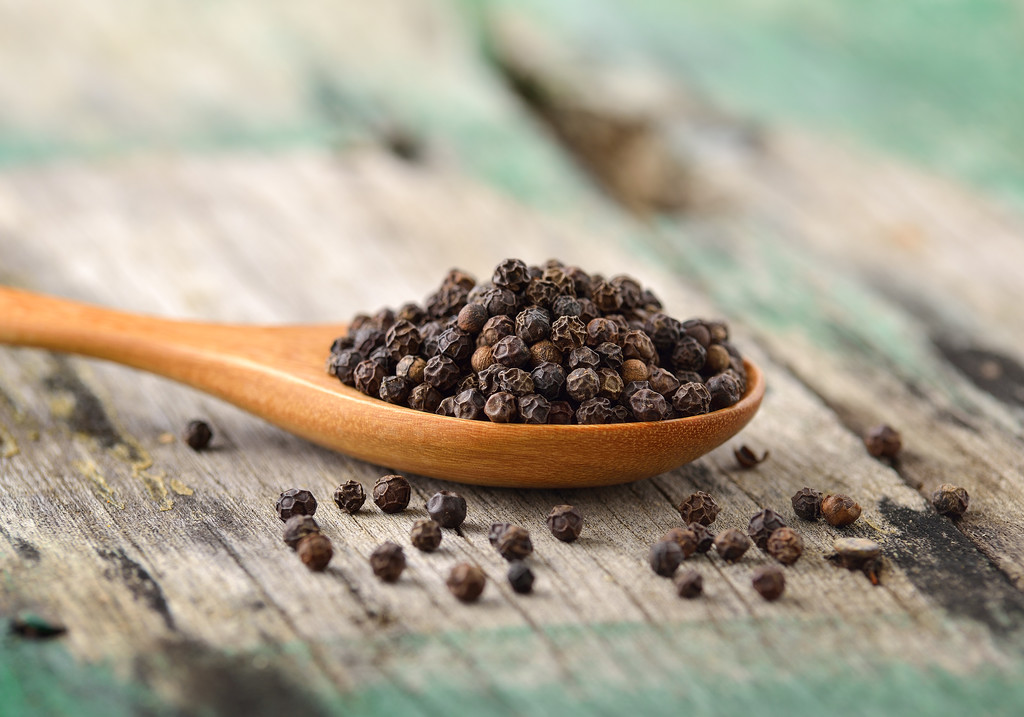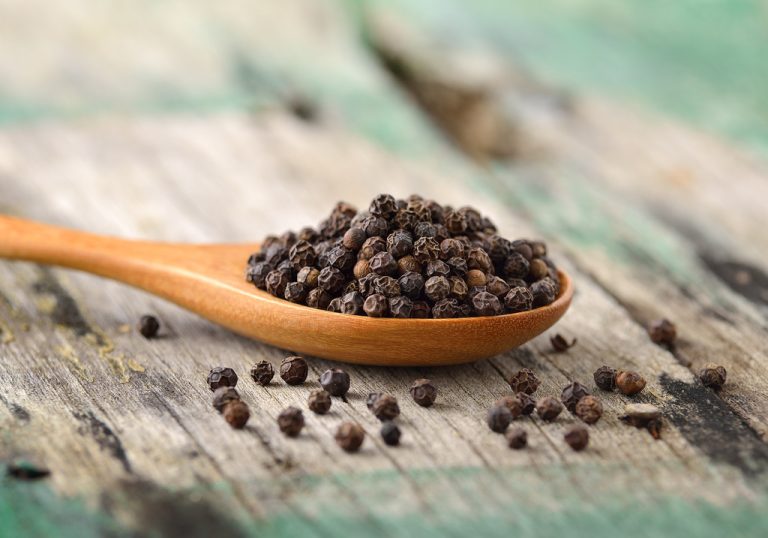Apart from salt, no other spice is used as frequently in German cuisine as black pepper. What many people don’t know, however, is that black pepper has long been considered a remedy and has numerous health benefits.

How is black pepper different from other types of pepper?
Whether white, green, red or black pepper – all come from the same plant species, the pepper bush (Piper nigrum). Depending on the time of harvest and further processing, the peppercorns then get their specific color.
For the black pepper, the unripe, green peppercorns are harvested and stored in heaps for a few days. The grains are then dried in the sun.
The types of pepper differ not only in appearance, but also in the degree of sharpness, the taste and the composition of their components. White and black pepper are the hottest and have the highest levels of piperine — see why this ingredient is so important below.
use in the kitchen
From sweet to savory – pepper goes well with almost every dish. So it is not surprising that it is the second most used spice in German cuisine after salt. At least one type of pepper is therefore included in numerous spice mixtures.
The black pepper has a particularly hot aroma and a light citrus note. White pepper, on the other hand, is less aromatic and fruity, while green pepper is mild and has a light herbal note. The fully ripe red pepper is rarely eaten in this country due to its perishability.
Tip: Pepper that has already been ground has already lost large parts of its ingredients and aroma. Therefore, always use whole grains that you grind freshly just before use.
Black pepper – the most important active ingredients
Pepper contains over 200 different components. From a medical point of view, the most interesting is the alkaloid piperine. Numerous health-promoting effects are attributed to this ingredient. The traditional areas of application range from colds and flu to digestive problems and diabetes to rheumatic diseases and muscle pain.
Recent human studies have demonstrated its digestive, antidiabetic, anticarcinogenic and antiasthmatic effects, among other things. Also, it is scientifically proven that piperine promotes the absorption of nutrients as well
antifungal
antioxidant
expectorant
anti-inflammatory
antimicrobial
works (see review from 2017). The Federal Center for Nutrition emphasizes above all the digestive effect – since piperine stimulates the saliva and gastric juice secretion. The list of potential applications is impressively long.
Other important ingredients are various essential oils, flavonoids and various piperine derivatives.
An English-language Open Access Scientific Report from India provides a comprehensive overview of the numerous active ingredients and areas of application of black pepper.
Piperine as a bioenhancer
Piperine also deserves special attention because it increases the bioavailability of various other components. Such substances are called bioenhancers. Piperine was the first bioenhancer identified in 1979 – and is still considered the most effective substance of this kind.
The most prominent partner substance whose bioavailability is increased by piperine: curcumin, the most important active ingredient in turmeric. When combined with piperine, the effectiveness of curcumin is increased by up to 20 times. That is why it is often recommended to add some black pepper to turmeric for medicinal purposes – as is done with the healing golden milk. Black pepper is also said to increase the bioavailability of selenium, vitamin A and vitamin C.
Use black pepper effectively and safely
If you want to benefit from the health effects of black pepper, you can of course add the spice to your food as usual. You should not cook the pepper at the same time, but only add it to the finished dish at the end.
However, if you want to use the black pepper specifically for colds and illnesses, you can use a higher dose. The already mentioned golden milk with a high pepper content is ideal for this. You can also add freshly ground pepper to your tea – for example in combination with fresh turmeric. Pepper is also popular with colds when combined with hot milk and honey.

possible side effects
In general, black pepper is considered very safe. However, you should never consume the ground spice individually, as the particles could get into the lungs and irritate them severely. If you suffer from acute stomach or intestinal problems, you should discuss the application with your doctor beforehand. You should also avoid large amounts of black pepper during pregnancy and breastfeeding.

